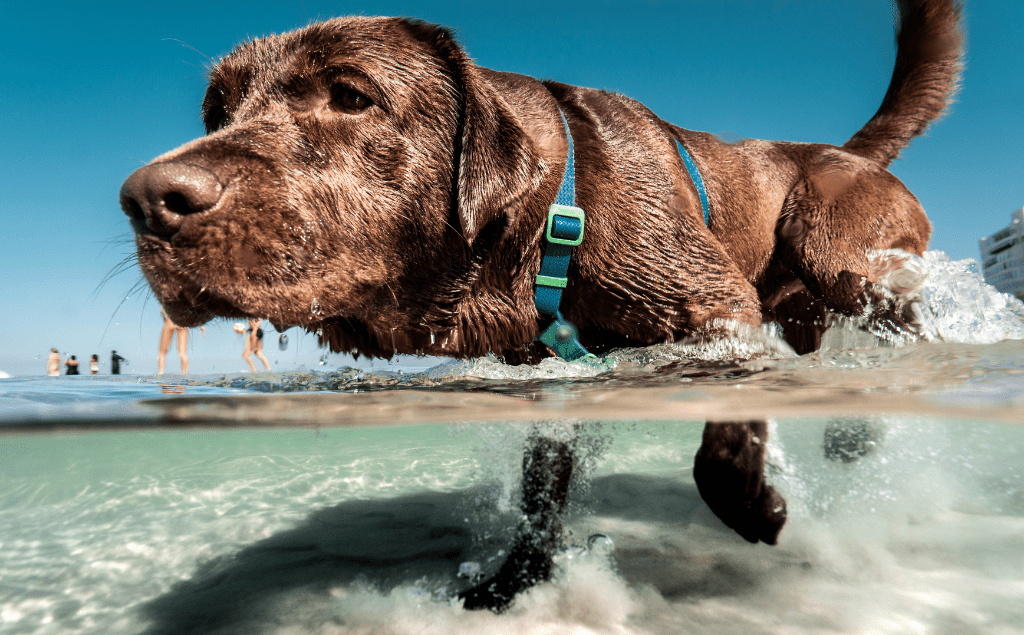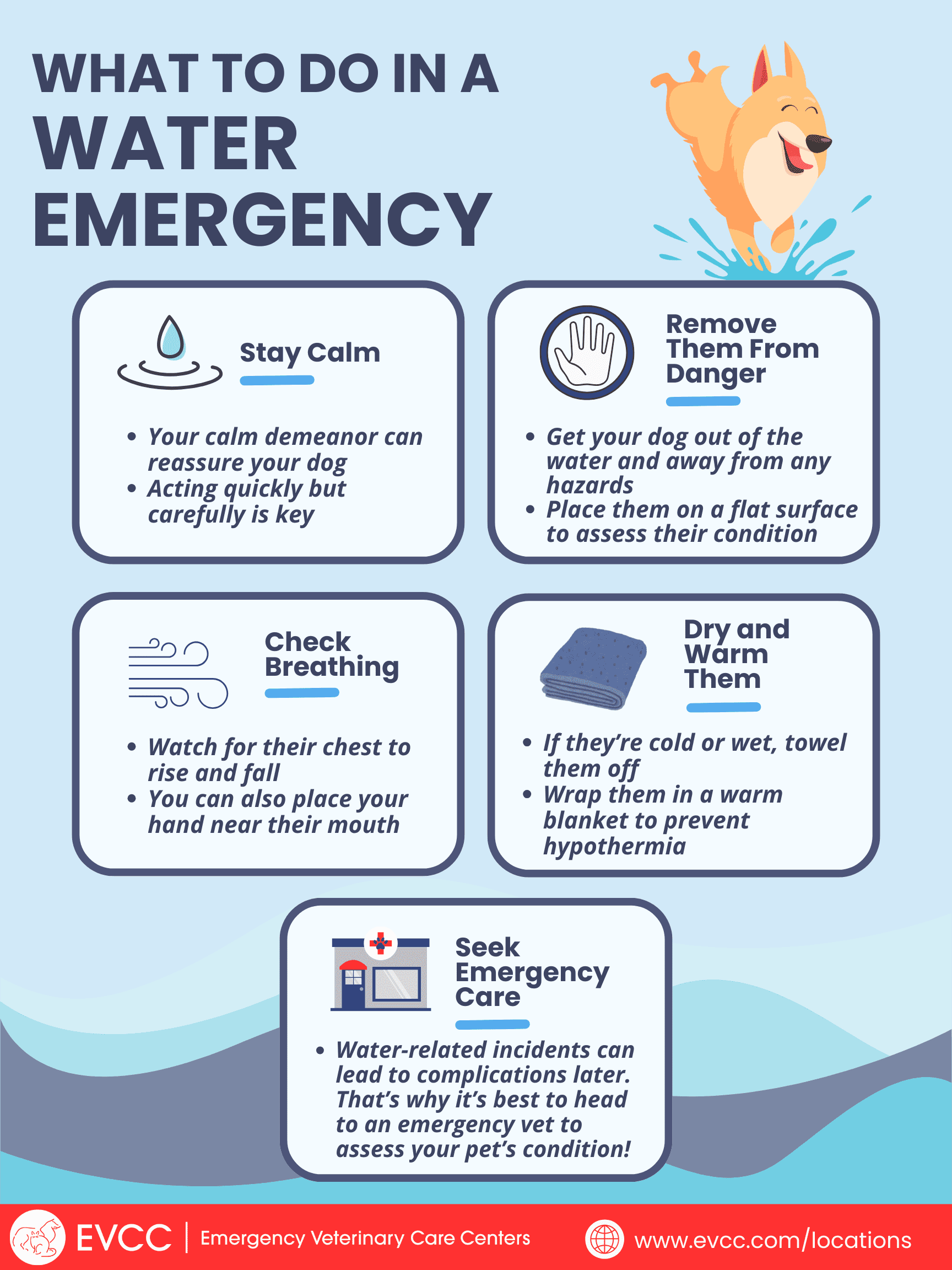
Canine Water Safety 101: Protecting Your Dog on the Water
Summer’s almost here, and that means plenty of opportunities for fun days at the lake, pool or beach with your furry best friend. But while water-related activities are “boatloads” of fun, they also come with risks every responsible pet owner must consider.
Did you know that dogs can drown? Or that certain types of water can pose life-threatening risks to your pet? By learning some water safety tips and how to handle potential accidents, you’ll be better prepared to keep your dog safe this summer.
The 8 Most Common Water-Related Cases We See
Whether they’re around water at the dog park, pool, or the beach, there are several additional dangers to keep in mind.
1. Drowning
Not all dogs are natural swimmers—a common misconception many pet owners have. While breeds like Labradors and Golden Retrievers typically take to water with ease, others, such as Bulldogs and Pugs, may struggle to stay afloat due to their body structure.
Before letting your dog into the water, check their comfort level by starting in a shallow area and always supervise them closely. A dog life jacket adds an extra layer of safety, especially if you're on a boat or in deep water.
Pools can be particularly dangerous for dogs, especially puppies, who might fall in and be unable to find an easy exit.
Dogs can quickly tire in the water, leading to panic or even drowning. To prevent pool accidents...
- Ensure the pool is properly fenced or covered to avoid unsupervised access to water
- Always supervise pool time
- Teach your dog where the steps are
- Consider installing a pet-safe pool alarm or ramp for easier exits
2. Water Toxicity
Water toxicity in dogs, also known as water intoxication or hyponatremia, is a potentially life-threatening condition that occurs when a dog ingests too much water in a short amount of time.
Small dogs with lower body mass and breeds with a high drive for retrieving and swimming like Labs, Goldens, and Border Collies are especially susceptible to this emergency condition. It leads to a dangerous dilution of sodium levels in the blood, causing cells to swell—including brain cells—which can result in serious health issues and even death.
- Playing in water for long periods (e.g., swimming, diving, or fetching toys from water)
- Hose or sprinkler obsession (biting or playing with running water)
- Excessive water drinking due to medical or behavioral issues or on hot summer days
- Lethargy or weakness
- Loss of coordination or stumbling
- Nausea and vomiting
- Bloating
- Pale gums
- Excessive salivation
- Dilated pupils
- Trouble breathing
- Seizures
- Coma (in severe cases)
There are several steps you can take to prevent hyponatremia, such as:
-
Limit long play sessions in water (take breaks every 10–15 minutes).
-
Discourage obsessive water play (i.e. biting at hoses).
-
Watch for signs of excessive water intake.
-
Provide safe alternatives for high-drive dogs (toys or puzzles).
3. Blue-Green Algae Poisoning
Some lakes and ponds may contain harmful blooms of cyanobacteria, which is more commonly known as blue-green algae.
Blue-green algae can often be found in still or slow-flowing freshwater ponds and lakes. The toxins produced from these algae blooms include microcystin and anatoxin, which can lead to liver damage, neurological issues, and even death if ingested.
Symptoms of blue green poisoning can appear quickly and include:
- Vomiting and diarrhea
- Difficulty breathing
- Seizures or muscle tremors
- Weakness or lethargy
If you suspect your dog has been exposed to blue-green algae, contact an emergency vet immediately.
4. Eating Sand
At the beach, dogs love to dig and play fetch. However, it can lead to accidental ingestion of sand.
In small amounts, it might seem harmless, but eating too much sand can lead to a serious condition known as sand impaction. Sand can clump together in the intestines and create a blockage, which often requires emergency treatment.
After a day at the beach, watch for signs such as:
- Vomiting
- Constipation or straining to defecate
- Abdominal pain
- Lethargy
If you notice these symptoms after a beach outing, seek veterinary care immediately.
5. Hypothermia
Even on warm days, bodies of water like lakes or rivers can be much colder than they appear. Prolonged exposure to cold water can lead to hypothermia, especially for smaller breeds or dogs with short coats.
Some common clinical signs of hypothermia include:
- Shivering or trembling
- Sluggishness or confusion
- Pale or gray gums
- Rapid or shallow breathing
If hypothermia occurs, move your dog to a warm place, wrap your dog in a towel or blanket and seek immediate veterinary care.
6. Wildlife Hazards (Including Snake Bites)
Depending on the area, your dog may encounter wildlife near the water, such as snakes. Snake bites are dangerous and often painful. Symptoms to watch for include:
- Swelling around the bite area
- Puncture marks or bleeding
- Weakness or collapse
- Difficulty breathing
Do not attempt any at-home remedies for snake bites; instead, bring your dog to an emergency vet as soon as possible.
*It’s important to make sure your dog is up to date on their rabies vaccine. Not only is it legally required in most states to prevent infection, but rabies is a deadly disease with no known cure.
7. Limber Tail
Also known as “swimmer’s tail” or “cold tail,” limber tail is a condition that can affect dogs after swimming or prolonged time in cold water. It results in a limp, painful tail that hangs straight down.
While it’s usually not serious, it can be very uncomfortable and may limit your dog’s movement. Your vet will often prescribe anti-inflammatory pain medication to treat the inflamed muscles/nerves. Rest and warm compresses typically resolve the issue within a few days.
8. Boating and Motorized Watercraft Accidents
If you’re boating with your dog, they could naturally wander to the edge, risking falls into the water. Motorized watercrafts also introduce dangers from spinning propellers.
Always keep dogs secure, preferably with a life jacket, and be mindful of docking areas, where collisions often occur.
What To Do in a Water Emergency
Even with the best precautions, accidents can happen. If your dog experiences a water-related emergency, here’s what you need to do immediately:
1. Stay Calm
Your calm demeanor can reassure your dog. Acting quickly but carefully is key.
2. Remove Them from Danger
Get your dog out of the water or away from any hazards like boats or wildlife. Place them on a flat surface to assess their condition.
3. Check Breathing
To check if your dog is breathing, watch for their chest to rise and fall, indicating each breath. Alternatively, you can place your hand near their mouth to feel air movement. A normal respiratory rate for dogs is between 15-30 breaths per minute.
If your dog is breathing shallowly or not at all, rush them to the nearest emergency vet right away. You may also begin CPR if the dog is not breathing, but ONLY if you have been trained for pets.
4. Dry and Warm Them
If they’re cold or wet, towel them off and wrap them in a warm blanket to prevent hypothermia.
5. Seek Emergency Care
Even if your dog seems fine, a water-related incident may lead to complications later. Rushing to an emergency vet ensures your pup gets a thorough examination.
At Emergency Veterinary Care Centers (EVCC), we specialize in handling pet emergencies, including water-related incidents. With locations near many popular lakeshores in Highland, IN; Westville, IN; Mishawaka, IN; Holland, MI, and our soon-to-open Kalamazoo, MI hospital, your dog’s health is always in trusted hands.

Stay Knowledgeable, and Prepare for Safe and Fun Summer Adventures
Your dog deserves all that summer has to offer, but safety should always come first. By understanding the potential risks, keeping a watchful eye, and knowing how to act in an emergency, you’re giving your dog the best chance at a happy, yet safe summer.
If you have any concerns or need immediate care, don’t hesitate to contact one of our EVCC locations. Our team is here 24/7 to assist with any urgent need.
Here’s to unforgettable (and safe!) adventures with your best friend!
Recent Posts
About Us
At Emergency Veterinary Care Centers (EVCC), we know that pet emergencies are unpredictable and often stressful. That's why our team, with over 20 years of emergency and critical care experience, is ready to assist you and your pet in the toughest situations.


